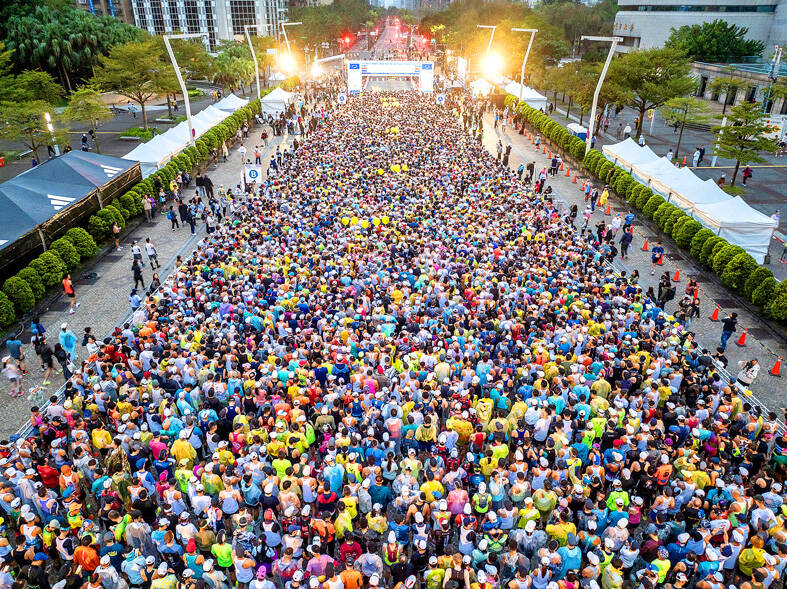People should take extra precautions when exercising in cold weather to protect the heart and avoid injuries, the Health Promotion Administration (HPA) advised.
The Taipei Marathon, the largest marathon in the nation, took place yesterday, while a continental cold air mass brought temperatures down to around 10?C in northern Taiwan in the morning.
Low temperatures can increase the risk of cardiovascular diseases, so runners and people who exercise outdoors should take extra precautions, the HPA said.

Photo: Screen grab from the Taipei Marathon’s Facebook page
They should avoid going outdoors too early in the morning on cold days, and should remember to “keep warm, do warm-ups, drink water, and adjust exercise timing” to stay safe and reduce the risk of cardiovascular disease, HPA Director-General Wu Chao-chun (吳昭軍) said.
People should keep warm by layering clothes and then gradually removing them as their body temperature rises during exercise. They should then put more layers on to keep warm after wiping sweat away at the end of the exercise, the HPA said.
People should “do sufficient warm-ups” before exercising to increase their muscle temperature through increased blood flow, improve muscle and joint mobility, and avoid sports injuries, it said, adding that the suggested warm-up time is five to 10 minutes in the summer, but 15 to 20 minutes in the winter.
The body still loses water in cold temperatures. When there is insufficient water in the body, the blood might thicken and cause poor circulation, so people should drink water in small amounts many times during exercise to stay hydrated, the HPA said.
During outdoor activities, it is recommended that people drink about 200ml to 300ml of water every 15 minutes. If they exercise for more than an hour and are clearly sweating or panting, they should also consume some carbohydrates and electrolytes, but avoid beverages high in sugars, caffeine or alcohol, it added.
The HPA also suggests that people adjust their exercise timing on cold days by avoiding the hours when the temperatures are lowest — early morning and evening — and go with at least one partner to look out for each other.
When coming indoors from a cold outdoor environment, people — especially those with poor blood vessel elasticity or cardiovascular disease — should take some time for their body to gradually warm up before they take a hot bath to avoid dilatation of their blood vessels due to dramatic temperature changes, it said.
They should also keep warm after taking a hot bath and avoid immediately going back to a cold environment to reduce the risk of cardiovascular events, it added.
The number of outpatients with cardiovascular diseases surges when temperatures drop dramatically, with myocardial infarction, aortic dissection and cerebrovascular incidents being the most prevalent cases, National Taiwan University Hospital cardiovascular surgery team director Yu Hsi-yu (虞希禹) said.
People with the “three highs” — high blood pressure, high blood sugar and high cholesterol — are prone to these cardiovascular diseases, while those who rarely exercise, eat an unhealthy diet or have metabolic syndrome should also be careful, he said, adding that regular medication is an indispensable preventive measure for serious cases.
People should understand their own body condition and chronic disease-related risks before engaging in strenuous exercises or sports events, and they are advised to see a doctor if there is any concern, he said.
Additional reporting by Lin Chih-yi and CNA

An essay competition jointly organized by a local writing society and a publisher affiliated with the Chinese Communist Party (CCP) might have contravened the Act Governing Relations Between the People of the Taiwan Area and the Mainland Area (臺灣地區與大陸地區人民關係條例), the Mainland Affairs Council (MAC) said on Thursday. “In this case, the partner organization is clearly an agency under the CCP’s Fujian Provincial Committee,” MAC Deputy Minister and spokesperson Liang Wen-chieh (梁文傑) said at a news briefing in Taipei. “It also involves bringing Taiwanese students to China with all-expenses-paid arrangements to attend award ceremonies and camps,” Liang said. Those two “characteristics” are typically sufficient

A magnitude 5.9 earthquake that struck about 33km off the coast of Hualien City was the "main shock" in a series of quakes in the area, with aftershocks expected over the next three days, the Central Weather Administration (CWA) said yesterday. Prior to the magnitude 5.9 quake shaking most of Taiwan at 6:53pm yesterday, six other earthquakes stronger than a magnitude of 4, starting with a magnitude 5.5 quake at 6:09pm, occurred in the area. CWA Seismological Center Director Wu Chien-fu (吳健富) confirmed that the quakes were all part of the same series and that the magnitude 5.5 temblor was

The brilliant blue waters, thick foliage and bucolic atmosphere on this seemingly idyllic archipelago deep in the Pacific Ocean belie the key role it now plays in a titanic geopolitical struggle. Palau is again on the front line as China, and the US and its allies prepare their forces in an intensifying contest for control over the Asia-Pacific region. The democratic nation of just 17,000 people hosts US-controlled airstrips and soon-to-be-completed radar installations that the US military describes as “critical” to monitoring vast swathes of water and airspace. It is also a key piece of the second island chain, a string of

The Central Weather Administration has issued a heat alert for southeastern Taiwan, warning of temperatures as high as 36°C today, while alerting some coastal areas of strong winds later in the day. Kaohsiung’s Neimen District (內門) and Pingtung County’s Neipu Township (內埔) are under an orange heat alert, which warns of temperatures as high as 36°C for three consecutive days, the CWA said, citing southwest winds. The heat would also extend to Tainan’s Nansi (楠西) and Yujing (玉井) districts, as well as Pingtung’s Gaoshu (高樹), Yanpu (鹽埔) and Majia (瑪家) townships, it said, forecasting highs of up to 36°C in those areas